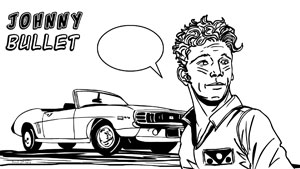|
|
|
The Empty Throne cover image is courtesy of barnesandnoble.com. |
Follow me on Twitter.
The Empty Throne is the latest novel from Bernard Cornwell, a popular British author of historical novels. This is the eighth book in Cornwell’s “Saxon Tales” series and continues the story of Saxon warlord, Uhtred of Bebbanburg.
The Empty Throne follows the events depicted in 2014's The Pagan Lord: A Novel, and the new novel is largely set in Saxon Mercia, with some scenes set along the coast of Wales. In The Empty Throne, Uhtred fights to assure the survival of Mercia during a conflict of succession that will shape the future of both Mercia and of its immediate neighbor to the south, the Saxon kingdom of Wessex.
The Empty Throne is set in Britain and opens early in the tenth century AD. Æthelred, the ruler of Mercia, is dying, but he has no legitimate heir. There is only his wife, Æthelflaed, who is also the sister of King Edward of Wessex, and Æelfwynn, the daughter of Æthelred and Æthelflaed. There is turmoil among the Saxons over the future of Mercia.
King Edward would love to merge his Wessex with Mercia, but the proud Mercians want their own leader. The soon-to-be widow, Æthelflaed, has all the makings of a leader, especially as she is widely loved and respected by the people of Mercia. But can Saxon warriors ever accept a woman as their ruler, especially when some of those Saxons want to control Mercia for themselves?
Lord Uhtred has long supported Æthelflaed, but he was grievously wounded at the Battle of Teotanheale (fought in The Pagan Lord). Although he is still recovering, Uhtred has many goals: recover Ice-Spite, the sword that wounded him; fight the Vikings that are encroaching on Wales and northern Mercia; and uncover the conspiracy against Æthelflaed. In the battle for power in Mercia, Uhtred is forced to play a game of thrones because there can be only one ruler.
THE LOWDOWN: The previous two novels by Bernard Cornwell that I have read, 1356 and The Pagan Lord, were battle-heavy tomes of historical fiction. The clash of swords, axes, shields, etc. resulted in spurts of blood, severed heads and limbs, and a pile of dead bodies that would scare even vultures. For all the masculine bump-and-grind of war, both novels also offered adventure as the characters traveled far and wide, chasing enemies and rivals and their own goals.
The Empty Throne is also filled with bloody dismemberment and pitched battle, but it is also about courtly intrigue and the larger ambitious of kings, lords, and nobles, and the men who serve them (whose ambitions are often larger than their lords and masters). The Empty Throne is smart and sarcastic when dealing with intrigues and plots and those darned Christians, revealing the often amusing vanity of the chief plotters and of the faithful.
The Empty Throne is also a bit sentimental. Lord Uhtred is in the twilight of his life, and his injuries have slowed him. His vulnerability makes him funnier and forced to be even more crafty and devious. That's the difference in The Empty Throne, it finds the quiet humanity in a turbulent time of political struggle, of sectarian strife, and of an uncertain future. So Bernard Cornwell, who writes the best battle scenes (as George R.R. Martin says), makes the best of his characters. They are not simply warriors; they are also fallible and even frail in a most human way. A thinking Uhtred is every bit as interesting as a killing Uhtred.
POSSIBLE AUDIENCE: Fans of Bernard Cornwell and of historical fiction will want to sit near The Empty Throne.
www.bernardcornwell.net
© Copyright 2002-2025 by Toon Doctor Inc. - All rights Reserved. All other texts, images, characters and trademarks are copyright their respective owners. Use of material in this document (including reproduction, modification, distribution, electronic transmission or republication) without prior written permission is strictly prohibited.

